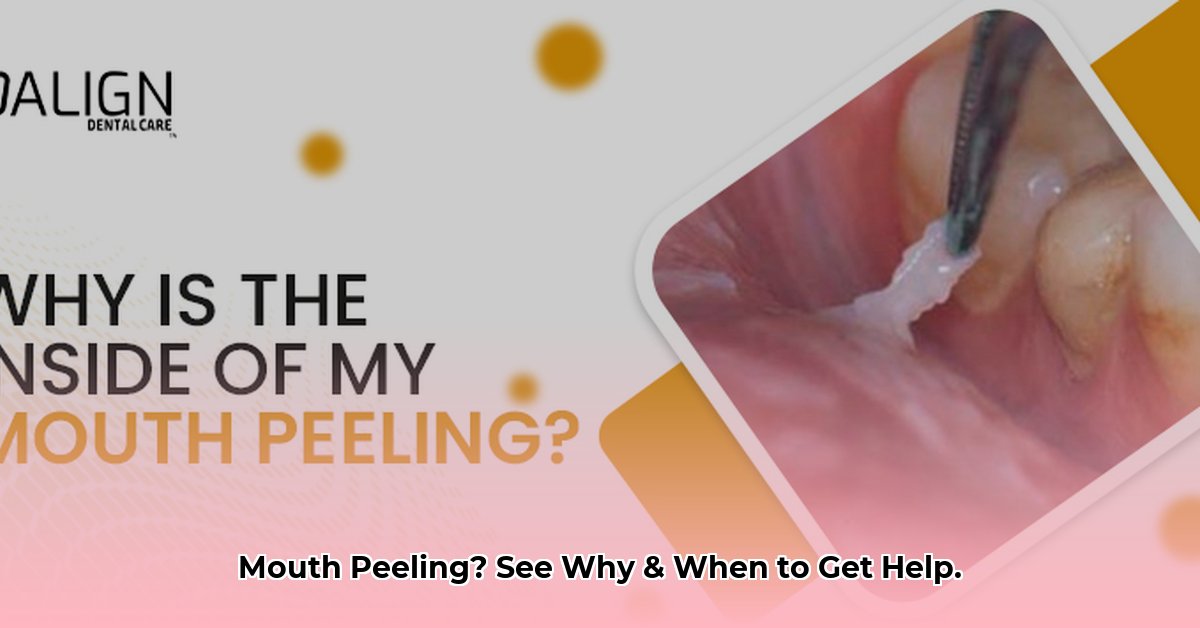This guide provides a comprehensive overview of the causes, treatments, and warning signs associated with peeling skin inside the mouth. We’ll explore various potential reasons for this condition, ranging from simple irritations to more complex medical issues, and offer practical advice on how to address them.
Decoding Your Peeling Mouth: Common Causes
Peeling skin inside the mouth, while often harmless, can be uncomfortable and concerning. Understanding the underlying cause is crucial for effective treatment. Let’s explore some of the most common culprits:
Mechanical Irritation
The delicate lining of your mouth can be easily irritated by physical trauma. Consider these possibilities:
- Accidental Bites: Biting your cheek or lip, especially during chewing, is a frequent cause of minor injury and subsequent peeling.
- Sharp Foods: Crunchy snacks like chips or foods with sharp edges can scratch the inside of your mouth, leading to peeling as the tissue heals.
- Dentures or Braces: Ill-fitting dentures or braces can rub against the mucous membranes, causing chronic irritation and peeling.
- Aggressive Brushing: Brushing too hard or using a hard-bristled toothbrush can also traumatize the delicate oral tissues.
Chemical Irritations
Certain substances can trigger a reaction in the mouth, causing the lining to peel:
- Spicy or Acidic Foods: Highly spiced foods or those high in acidity, such as citrus fruits and tomatoes, can irritate the oral mucosa.
- Harsh Toothpaste or Mouthwash: Some toothpastes contain sodium lauryl sulfate (SLS), a foaming agent that can irritate sensitive mouths. Similarly, certain mouthwashes can also cause irritation and peeling.
- Tobacco Products: Smoking and chewing tobacco significantly irritate the mouth’s lining, increasing the risk of peeling and other oral health problems.
Allergic Reactions
The mouth can also react to allergens, resulting in peeling skin:
- Foods: Common food allergens like nuts, shellfish, and certain fruits can trigger oral allergic reactions.
- Dental Materials: Some individuals may be allergic to materials used in dental restorations, such as fillings or dentures.
- Other Allergens: Ingredients in toothpaste, mouthwash, or even chewing gum can also be allergens for some people.
Infections
Several infections can cause mouth peeling, often accompanied by other symptoms:
- Oral Thrush (Candidiasis): This fungal infection commonly causes white patches and peeling, often with a burning sensation. Thrush can affect a baby’s mouth or an adult’s mouth.
- Viral Infections: Viral infections, such as herpes simplex (cold sores) or hand, foot, and mouth disease, can present with blisters and peeling skin.
- Bacterial Infections: Though less common, bacterial infections can also contribute to oral inflammation and peeling.
Systemic Conditions
In some cases, mouth peeling might be a symptom of an underlying medical condition:
- Dry Mouth (Xerostomia): This condition, often caused by medications or certain medical conditions, can make the mouth more susceptible to irritation and peeling.
- Nutritional Deficiencies: Deficiencies in certain B vitamins or iron can sometimes affect the mucous membranes, potentially leading to peeling.
- Autoimmune Diseases: Conditions like lupus, pemphigus vulgaris, lichen planus, or Sjögren’s syndrome can have oral manifestations, including peeling skin.
Soothing the Peel: Treatment Options
The most effective treatment for peeling mouth skin depends on the underlying cause. Here’s a breakdown of common approaches:
Home Remedies
For mild cases caused by irritation or dryness, these home remedies may offer relief:
- Hydration: Drink plenty of water throughout the day to keep your mouth moist.
- Gentle Oral Hygiene: Brush and floss regularly, but use a soft-bristled toothbrush and avoid aggressive scrubbing.
- Avoid Irritants: Identify and eliminate potential irritants, such as spicy foods, acidic beverages, or harsh oral hygiene products.
- Salt Water Rinses: Rinsing your mouth with warm salt water several times a day can help soothe irritation.
- Aloe Vera Gel: Applying aloe vera gel to the affected areas may provide some relief.
Medical Interventions
More persistent or severe cases of mouth peeling may require professional medical treatment:
- Addressing Underlying Conditions: If the peeling is linked to a medical condition like dry mouth or an autoimmune disease, managing that condition is essential.
- Medications: Antifungal medications for oral thrush, antiviral medications for viral infections, or corticosteroids for inflammatory conditions may be prescribed.
- Nutritional Supplements: If a nutritional deficiency is suspected, supplements may be recommended under the guidance of a doctor or registered dietitian.
- Allergy Management: Identifying and avoiding allergens is key to managing allergy-related mouth peeling. Antihistamines may also be beneficial.
Recognizing Red Flags: When to See a Doctor
Most cases of mouth peeling resolve with simple home care or lifestyle changes. However, it’s crucial to seek professional medical advice if:
- Peeling persists for more than two weeks.
- Peeling is accompanied by pain, bleeding, or open sores.
- You have difficulty swallowing or speaking.
- You notice white patches, unusual lumps, or other concerning changes in your mouth.
- You experience fever, swollen lymph nodes, or other signs of infection.
These symptoms could indicate a more serious underlying issue requiring prompt medical attention. Early diagnosis and treatment are crucial for optimal outcomes. Remember, this guide is intended for informational purposes and does not replace professional medical advice. Always consult with a doctor or dentist for any persistent or concerning symptoms. They can provide an accurate diagnosis and develop a personalized treatment plan to address your specific needs.
- Borosilicate Glass Meal Prep Containers Offer Durable Oven-Safe Storage - January 29, 2026
- Glass Storage Bowls With Glass Lids Offer Superior Freshness - January 28, 2026
- Rectangular Glass Food Storage Containers For Meal Prep - January 27, 2026










